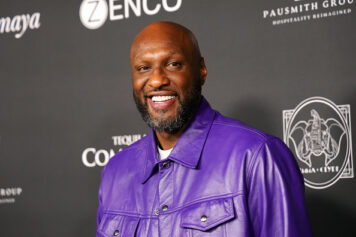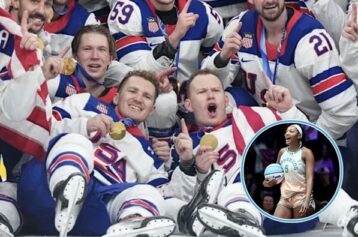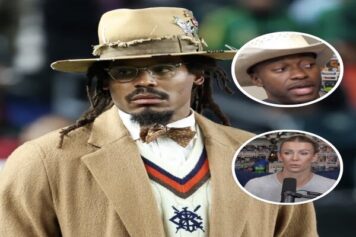When Kendrick Lamar signed to Aftermath Records earlier this year, the naysayers didn't waste a second before stating that the Compton emcee would fall victim to the dreaded Dr. Dre delay. So much for the haters. The reigning BET Hip-Hop Awards lyricist of the year, sees his major label debut, good kid, m.A.A.d city: A Short Film By Kendrick Lamar hit stores today. Instead of posting a traditional review, TSL tracked down the musicians, producers and engineers that crafted the album and had them share their experiences. This is the smart, accessible hip-hop that "purists" have been clamoring so before you go cop the CD/legal download check this track-by-track breakdown of what many critics and fans are already labeling as a classic debut.
**************************
"Sherane aka Master Splinter's Daughter" (produced by Tha Bizness)
Dow Jones of (Tha Bizness): Kendrick just really believed in the versatility of our sound and wanted to push the envelope, and do something that sounded really outside the box. It’s something that people might not have heard from us. "Sherane" just ended up being the perfect match when it was all said and done and just off the early reactions we can see that everybody is just excited about the finished project, as we could have hoped. We already had a few songs done with Kendrick for the album, but instead of just sitting back and being complacent and thinking we have already done it, we just kept working and creating new music and "Sherane" was a product of that special attention and detail.
Hen (Tha Bizness): It was a perfect execution of a story telling record. His delivery and the level of detail in the lyrics made it so easy for you to see the visual. Once we heard the full body of work that GKMC is, we realized how special "Sherane" was, and how it was about setting the tone for the whole album. Making all the songs have their own special value that made the whole album a classic, because it makes sense and each songs rolls into the other like pages of a book and it keeps you locked in until the end.
"Bitch, Don't Kill My Vibe" (produced by Sounwave)
Sounwave (producer/longtime collaborator): Kendrick is real hands on. He came to me with this group he really liked and told me to check them out. I checked out the album and I heard so much incredible stuff that I could flip samples from. He pretty much gave me the green light to pick one record and find a part off of it. I found a skinny part of a record and I couldn’t get the drums right for nothing so I sent him a loop. He did 50 percent of the record off of that loop. That encouraged me to add the drums and the rest of the music. Once I did that, he came back in and added all of the extras to it and made it what it is right now. Usually it is just me and Kendrick in my studio going through a bunch of different patterns, which inspires him to do different songs or he gives me a flow and I'm gonna do a pattern based off of that flow. That is how 90 percent of our records have been done from "A.D.H.D." all the way up to "The Spiteful Chant" all the way up to "Bitch, Don't Kill My Vibe."
Backseat Freestyle (produced by Hit-Boy)
Sounwave: Kendrick did that when he was on tour. He came back and played it for me and I was blown away. We needed that energy for this album. When you listen to the skit before the song, it explains why it’s there. It’s not just a song we just threw on the album. It represents his homies always wanting him to kick freestyles.
The Art of Peer Pressure (produced by Tabu)
Tabu (producer): Our manager (Mickey) hooked us up with the Kendrick deal. Music-wise we made the beat inspired by a Danish group called Veto (rock/electro band). When we heard that the track was landed on Kendrick Lamar's album, we got really excited. We had already landed a
track on Schoolboy Q's album some time before ("Sacrilegious"), and we love what the TDE camp brings to the table, the sound and how they bring the good stuff back in hiphop (just like the '90s). So getting on Kendrick's album was just double bonus for us.
Sounwave: This is the oldest record we have on this album. That record was made in about 2010. It was one that just stuck with us. The story fit too perfect and the vibe of it just fit. We had to keep that one.
Ali (Kendrick's engineer/DJ): I'm not sure if it has been around since 2010, but it is definitely one of the early ones that we kept around. It's real sentimental. The story itself is classic. Anybody from L.A. or anybody that lives in any city can really relate to that record.
"Money Trees" featuring Jay Rock (produced by DJ Dahi)
DJ Dahi (producer): I made that beat about two or three months before Kendrick got hold of it. I listen to a lot of alternative music and one of my favorite bands is Beach House. I sampled their song "Silver Soul" and from there I flipped it and tweaked the song. I took it and did some work on it and did the joint. I think around the time of Coachella is when Kendrick got the beat. I met up with Kendrick a couple weeks after he finished the song, and when I heard it, I thought his flow and how he turned it into a catchy song was incredible. He did something that I wasn't expecting, at all. Kendrick is an artist that really has messages in his music. "Money Tree" is a day in Kendrick's life and the idea of it is, “they say money is the root of all evil but money is something everyone needs” It’s supposed to make your life better and, in a lot of ways, it does. But sometimes in the midst of chasing it, people do things that were not their intention. Kendrick has a way of saying that in the story but making it catchy.
Me, Kendrick and Ali bounced the song back and forth, doing some mixes and adding a couple things to it; but I actually didn't hear the final song until the record leaked. The version with Jay Rock's verse on it is amazing. I didn't expect him to get on it. He added a different element and he has one of the most memorable verses on the album.
"Poetic Justice" featuring Drake (produced by Scoop Deville)
Scoop Deville: I got together with Kendrick in the beginning of the year when he was in the studio recording a bunch of records with [Dr.] Dre and the Aftermath camp. Stat Quo brought some records that I did, Dre was really feeling "The Recipe" and a few other joints I did so he wanted me to be a part of the project. I did "Poetic Justice" about a year ago and I was holding on to it. I sent it over to Kendrick and he was feeling it from the jump. When I first found out that Drake was going to be on it, it was a shock because it meant that they were going to do something really big for the record. It is definitely something for the ladies, a radio friendly record and very different from the other records on the album.
"good kid" (produced by Pharrell)
Ali: Pharrell was in L.A. and he played the beat already with the hook on it. When Kendrick heard it, he was going through some shit and he told Pharell, he needed it right then and there.
"m.A.A.d city" feat. MC Eiht (produced by Sounwave and Terrace Martin)
Sounwave: We had a B.B. King sample that couldn't get cleared at the very last minute, so I hired Mary Keeting to play the strings and it came out 30 times better than the original.
Terrace Martin (producer/frequent collaborator): My contribution to m.A.A.d city came about after I heard the rap and the drums. It was all there but I felt like I could take it over the top. I wanted to give Kendrick and give the listeners something that I remember. The sound that hit me from Compton was similar to that sound of heavy scratches, worms, pianos, and boom-bap hip-hop drums. That was the Compton sound to me and, at the time, I felt he didn't have anything on his record to represent the first generation of Compton. We can't forget that, because without the first generation, you wouldn’t be here. We just wanted to really tap into that, that's why it’s so many scratches and you got Schoolboy Q talking in the background. Do you remember them old records and how it was always a random nigga talking and all this crazy shit going on? I wanted to give Compton a thank you, saying “this is what ya'll gave me, so I want to give it back to ya'll.” Especially to the new generation that really wasn't around during the NWA days. The way he rapping on that muthafucka, he already told the story, so all I did was put seasoning on that steak.
Sounwave: I think Ali had a relative that knew MC Eiht, so through that we just contacted him. He came to the studio and knocked his verse out in about 30 minutes and it was exactly what we wanted – that hardcore gritty Compton sound.
"Swimming Pools" (Drank) (produced by T-Minus)
T-Minus (producer): I sent him some beats and he chose that one. At the time I didn't know what he'd be rapping about over the beat; but I'm glad he went in that direction [anti-alcohol abuse]. I'm glad Kendrick and I could come together and change the direction music is currently going in.
"Sing About Me/I'm Dying of Thirst" (produced by Shyke Hutch & Sounwave/Like)
Sounwave: That was a record produced by Like. It was a great record, but I thought it was missing something so I had to hire violinist Mary Keeting to add a dramatic feel to it, because it’s a serious song. Kendrick felt like those two records went together based off of the positioning of it. At the end of the day, when you listen to "Sing About Me," those are all true stories pretty and "I'm Dying of Thirst" is a perfect follow up, showing this is what you need after you've been through "Sing About Me."
"Real" featuring Anna Wise (produced by Terrace Martin)
Terrace Martin: Making that song, we were all in New York and I was on the phone with my girl the whole time having an argument. We ended up breaking up. During that period, I was playing with a lot of salsa and samba bands, and I was kind of coming off of my Brazilian shit. So when we went to the studio, I asked Kendrick what tempo he wanted to be on. He gave me the tempo and instead of doing some typical stuff I did a Samba type vibe. At the time I was hella emotional and heartbroken (laughs), so I played these emotional ass chords and that’s pretty much how it happened.
That song is like a ghetto Brazilian song, but it’s so free. It’s about love and it’s beautiful. How that record came out is really how we thought it was gonna come out before we even started it. Working with Kendrick it’s like whatever we talked about happens and that is rare that I'm able to really be myself and produce a record for an artist. He let me be me. I trusted him and he trusted me and that’s how "Real" came about. I didn't even know he was going to keep all those elements on the song [Editors Note: the song is over seven minutes long].
The featured vocalist, Anna Wise, is a beautiful person. She's so gifted. She sings in tune, and that is a dying art that a lot of these vocalists don’t have. To me, she added that shit. There was a record that came out in the 1950s called "Girl from Ipanema" by Stan Goetz, written by Antonio Carlos Jobim and there is a woman on that song singing. That added this crazy, soft, beautiful warm tone and that’s what she did on "Real." She put the shit on top of that record to make it glow, now the record glows in the dark.
"Compton" (produced by Just Blaze)
Just Blaze (producer): "Compton" was originally conceptualized for Detox. I came up with the track and concept. Sly, an artist Dre was working with by the name of Hayes and myself brainstormed on a few ideas in terms of the content and hook.
We knew we wanted the record to be Compton-centric and we came up with an idea called "It all started out in Compton," which would have been an ode to the city as well as its rap legacy. It went through a few more changes in terms of guest appearances, but in the end Dre wanted it to be a song for Kendrick and himself. Once Kendrick's album started to come together, the track fit perfectly and the rest is history.
I'm pretty satisfied and the reaction to the record has been great. As long as the people love it, my job is done. I've been toying with the idea of releasing an extended version with a longer outro. Time permitting, I'd love to, just for the music heads out there.



